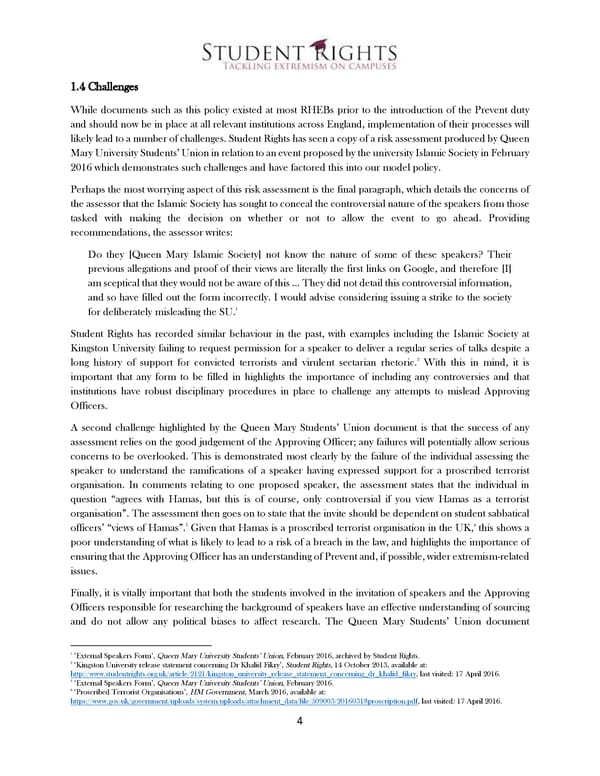! 1.4 Challenges While documents such as this policy existed at most RHEBs prior to the introduction of the Prevent duty and should now be in place at all relevant institutions across England, implementation of their processes will likely lead to a number of challenges. Student Rights has seen a copy of a risk assessment produced by Queen Mary University Students’ Union in relation to an event proposed by the university Islamic Society in February 2016 which demonstrates such challenges and have factored this into our model policy. Perhaps the most worrying aspect of this risk assessment is the final paragraph, which details the concerns of the assessor that the Islamic Society has sought to conceal the controversial nature of the speakers from those tasked with making the decision on whether or not to allow the event to go ahead. Providing recommendations, the assessor writes: Do they [Queen Mary Islamic Society] not know the nature of some of these speakers? Their previous allegations and proof of their views are literally the first links on Google, and therefore [I] am sceptical that they would not be aware of this … They did not detail this controversial information, and so have filled out the form incorrectly. I would advise considering issuing a strike to the society 1 for deliberately misleading the SU. Student Rights has recorded similar behaviour in the past, with examples including the Islamic Society at Kingston University failing to request permission for a speaker to deliver a regular series of talks despite a 2 long history of support for convicted terrorists and virulent sectarian rhetoric. With this in mind, it is important that any form to be filled in highlights the importance of including any controversies and that institutions have robust disciplinary procedures in place to challenge any attempts to mislead Approving Officers. A second challenge highlighted by the Queen Mary Students’ Union document is that the success of any assessment relies on the good judgement of the Approving Officer; any failures will potentially allow serious concerns to be overlooked. This is demonstrated most clearly by the failure of the individual assessing the speaker to understand the ramifications of a speaker having expressed support for a proscribed terrorist organisation. In comments relating to one proposed speaker, the assessment states that the individual in question “agrees with Hamas, but this is of course, only controversial if you view Hamas as a terrorist organisation”. The assessment then goes on to state that the invite should be dependent on student sabbatical 3 4 officers’ “views of Hamas”. Given that Hamas is a proscribed terrorist organisation in the UK, this shows a poor understanding of what is likely to lead to a risk of a breach in the law, and highlights the importance of ensuring that the Approving Officer has an understanding of Prevent and, if possible, wider extremism-related issues. Finally, it is vitally important that both the students involved in the invitation of speakers and the Approving Officers responsible for researching the background of speakers have an effective understanding of sourcing and do not allow any political biases to affect research. The Queen Mary Students’ Union document !!!!!!!!!!!!!!!!!!!!!!!!!!!!!!!!!!!!!!!!!!!!!!!!!!!!!!!!!!!!! 1 ‘External Speakers Form’, Queen Mary University Students’ Union, February 2016, archived by Student Rights. 2 ‘Kingston University release statement concerning Dr Khalid Fikry’, Student Rights, 14 October 2013, available at: http://www.studentrights.org.uk/article/2121/kingston_university_release_statement_concerning_dr_khalid_fikry, last visited: 17 April 2016. 3 ‘External Speakers Form’, Queen Mary University Students’ Union, February 2016. 4 ‘Proscribed Terrorist Organisations’, HM Government, March 2016, available at: https://www.gov.uk/government/uploads/system/uploads/attachment_data/file/509003/20160318proscription.pdf, last visited: 17 April 2016. 4! !
 A Model External Speaker Policy Page 5 Page 7
A Model External Speaker Policy Page 5 Page 7